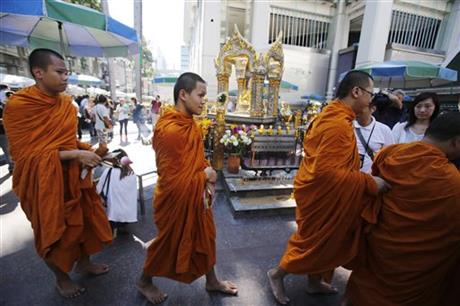
By NATTASUDA ANUSONADISAI and JOCELYN GECKER
Thailand’s military junta said Thursday that this week’s deadly bombing in downtown Bangkok that killed 20 people was “unlikely” to have been carried out by international terrorists. Police, meanwhile, said they suspected the plot was well-planned by a network of at least 10 people.
But three days after the attack at a revered shrine in central Bangkok, authorities appeared to have few solid leads into who carried out the deadliest attack in Thailand’s recent history.
Confusing statements emerged Thursday, with the military spokesman saying in a televised statement that investigators believe the attack wasn’t the work of international terrorists — a day after police issued an arrest warrant for the prime suspect who was described as a “foreign man.”
“Security agencies have collaborated with intelligence agencies from allied countries and have come to the same preliminary conclusion that the incident is unlikely to be linked to international terrorism,” said Col. Winthai Suvaree, the military spokesman.
But when contacted by telephone for clarification, he said that a link to global terrorism hadn’t been ruled out. “We still have to investigate in more detail,” he said.
Winthai also said on television that Chinese tourists, who were among the victims, were not the “direct target.” He did not elaborate.
The Monday evening attack at the Erawan Shrine, a popular tourist site that is known to attract Chinese visitors, left 20 people dead and more than 120 injured. Four Chinese citizens were among the dead.
No one has claimed responsibility for the blast, sparking a variety of theories into who might be behind it. One is that the blast was a revenge attack related to Thailand’s recent deportation to China of more than 100 Uighur Muslims, or that it could have been carried out by Islamist groups expanding their reach in Southeast Asia.
Police officials told reporters Thursday that authorities believed those behind the blast must have been planned it in advance, maybe a month ahead of time, and likely included a site inspection team, bomb makers, bombers and an escape team. But the comments appeared to be speculative, not based on firm evidence.
“This was a network. We think they would have needed at least 10 people,” said national police spokesman Lt. Gen. Prawut Thavornsiri.
So far the firmest clue comes from security camera footage that shows a young man in a yellow T-shirt leaving a backpack at the crowded shrine. Time stamps on the video show he left the temple about 15 minutes before the explosion.
Police on Wednesday released a sketch depicting the suspect, a young man wearing glasses with black-bushy hair. The arrest warrant described him as a tall “foreign man” with a fair complexion, a prominent nose and thick lips.
Authorities have offered a 1 million baht ($28,000) reward for information leading to his arrest.
A motorcycle taxi driver believed to have driven the suspect away from the scene told police the suspect handed him a piece of paper saying “Lumpini Park,” a nearby park, and was talking on the phone in a foreign language that was not English, Prawuth said. But they don’t have any indication what language it was.
Bangkok police on Thursday said they were trying to locate a tuk-tuk driver who may have driven the same suspect to the Erawan Shrine, and announced a 30,000 baht ($850) reward for him to come forward.
Two other people seen on the video near the man are also considered suspects in Monday’s deadly bombing, police said late Wednesday.
At a news conference, Prawut expressed uncertainty about the prime man’s origin, saying the suspect “looks like a foreigner” but “might have been in a disguise and wearing a fake nose” to conceal his identity.
He faces six charges including conspiring to commit premeditated murder and conspiring to commit a bombing that resulted in death and severe injuries.
Bangkok has seen politically charged violence in the past decade. The deadliest, in 2010, killed more than 90 people in two months and was centered on the same intersection where Monday’s bomb went off. But none of those attacks included a bomb that seemed intended to produce mass casualties.
Thailand has seen many violent attacks in recent years, particularly in a long-running insurgency by Muslim separatists that has killed over 5,000 in the country’s south. Those attacks, however, have never reached the capital.
Among the 20 people killed, Thai authorities have identified six victims as Thai and four as Malaysians, along with four Chinese, two people from Hong Kong including a British citizen, one Indonesian and one Singaporean. Two victims remain unidentified.



